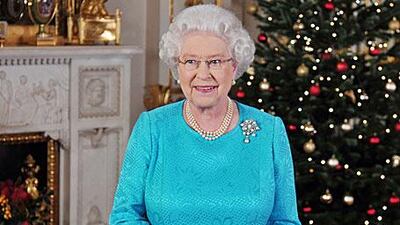LONDON // Queen Elizabeth II aligned herself firmly behind the military mission in Afghanistan when she praised the British troops' "positive contribution" to the campaign during her annual Christmas Day message yesterday. She also indicated her continuing worries about global warming when she called on the Commonwealth's 54 member nations to work together to tackle climate change.
On a day that gave the Queen her annual opportunity to address issues that concern her - without any input from politicians - British church leaders also seized the moment to address issues as diverse as the problems facing the young, to proposals to introduce the death penalty for homosexuals in Uganda. During her speech yesterday afternoon the Queen singled out the country's soldiers serving in Afghanistan. More than 100 British soldiers have been killed in Afghanistan over the past year and there has been a growing tide of sentiment against the deployment.
"I am sure that we have all been affected by events in Afghanistan and saddened by the casualties suffered by our forces serving there. Our thoughts go out to their relations and friends who have shown immense dignity in the face of great personal loss," she said. "But, we can be proud of the positive contribution that our servicemen and women are making, in conjunction with our allies. "Well over 13,000 soldiers from the United Kingdom, and across the Commonwealth - Canada, Australia, New Zealand and Singapore - are currently serving in Afghanistan. The debt of gratitude owed to these young men and women, and to their predecessors, is indeed profound."
Speaking from the White Drawing Room at Buckingham Palace, she also urged the Commonwealth, especially its young people, to take co-ordinated action on global issues. Describing the Commonwealth as "a strong and practical force for good", she pointed out that more than a billion people in that group of countries were now aged under 25. "Recently I attended the Commonwealth heads of hovernment meeting in Trinidad and Tobago and heard how important the Commonwealth is to young people," the Queen said.
"New communication technologies allow them to reach out to the wider world and share their experiences and viewpoints. For many, the practical assistance and networks of the Commonwealth can give skills, lend advice and encourage enterprise. "It is inspiring to learn of some of the work being done by these young people, who bring creativity and innovation to the challenges they face. "It is important to keep discussing issues that concern us all. There can be no more valuable role for our family of nations."
At the Commonwealth summit, the Queen told the heads of state that they should take the lead in environmental issues and her call yesterday was seen as reinforcing this message, particularly in the wake of the indifferent outcome of the Copenhagen summit. Her message included clips of the Commonwealth's youth giving voice to what the organisation means to them. As well as being broadcast by television and radio stations around the world, the address was simultaneously made available on the YouTube Royal Channel.
While the 83-year-old monarch has long experience of special messages at Christmas, the Rev Vincent Nichols gave his first since becoming Archbishop of Westminster, the leader of English and Welsh Roman Catholics, earlier this year. He tackled the growing problem of gang culture among the young, saying that many young people are drawn into gangs in an attempt to bolster their weakened identity. He said a recent visit to a young offenders' institution reminded him how many youths were attracted to gangs.
The archbishop said that happiness came from family and community, not status and fame. "We know that our happiness lies much closer to home - in our steady relationships of friendship and love - in family and community," he said during his Midnight Mass sermon at Westminster Cathedral. Dr Rowan Williams, the archbishop of Canterbury and head of the Anglican church in England and Wales, warned in his Christmas message that children are being forced to grow up too quickly.
He said parents must treasure the dependency of their children and rushing them to become independent leads to misery and exploitation. Dr John Sentamu, the archbishop of York, tackled a much more controversial subject: the anti-homosexual laws currently being debated in Uganda. A private member's bill, which is under discussion in Uganda's parliament, would result in both male and female homosexuals facing a minimum of life in prison if convicted of having sex. The death penalty would be imposed on anyone found guilty of having homosexual sex with a minor while even people failing to report homosexuality taking place could be sentenced to up to three years in prison.
Dr Sentamu, who was born in Uganda, said that current laws in the country meant the provisions in the bill were, in effect, already in place. "I'm opposed to the death sentence," he said. "I'm also not happy when you describe people in the kind of language you find in this private member's bill, which seems not only victimising but also a diminishment of the individuals concerned." He said that the Anglican church had been trying to help colleagues in Uganda draw up a considered response to the proposals.
Dr Sentamu said that, while many people had "traditional" views about sexuality, the Anglican church was committed to recognising that gay people were valued by God. Uganda's president, Yoweri Museveni, has been urged to consider the effects on the country's human rights record if the proposals become law. Sweden has also threatened to withdraw aid if the bill, introduced by MP David Bahati, is passed.
dsapsted@thenational.ae

